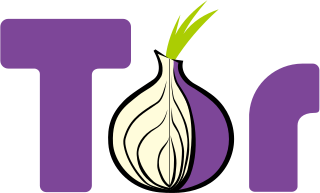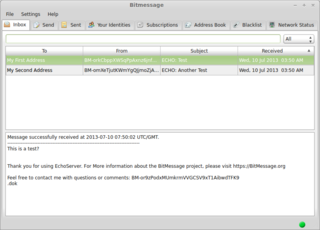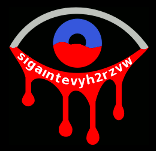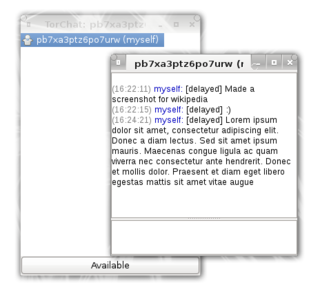 W
WTor, short for The Onion Router, is free and open-source software for enabling anonymous communication. It directs Internet traffic through a free, worldwide, volunteer overlay network, consisting of more than six thousand relays, for concealing a user's location and usage from anyone conducting network surveillance or traffic analysis. Using Tor makes it more difficult to trace the Internet activity to the user. Tor's intended use is to protect the personal privacy of its users, as well as their freedom and ability to conduct confidential communication by keeping their Internet activities unmonitored.
 W
W8kun, previously called 8chan, Infinitechan or Infinitychan, is an imageboard website composed of user-created message boards. An owner moderates each board, with minimal interaction from site administration. After going offline in August 2019, the site rebranded itself as 8kun and was relaunched in November 2019.
 W
WAlphaBay is a darknet market operating both as an onion service on the Tor network and as an I2P node on I2P. After it was shut down in July 2017 following law enforcement action in the United States, Canada, and Thailand as part of Operation Bayonet, it was relaunched in August 2021 by the self-described co-founder and security administrator DeSnake. The alleged original founder, Alexandre Cazes, a Canadian citizen born on 19 October 1991, was found dead in his cell in Thailand several days after his arrest, with police suspecting suicide.
 W
Warchive.today is an archive site which stores snapshots of web pages. It retrieves one page at a time similar to WebCite, smaller than 50 MB each, but with support for JavaScript-heavy sites such as Google Maps and progressive web applications such as Twitter.
 W
WBBC News is an operational business division of the British Broadcasting Corporation (BBC) responsible for the gathering and broadcasting of news and current affairs. The department is the world's largest broadcast news organisation and generates about 120 hours of radio and television output each day, as well as online news coverage. The service maintains 50 foreign news bureaus with more than 250 correspondents around the world. Fran Unsworth has been director of news and current affairs since January 2018.
 W
WBitmessage is a decentralized, encrypted, peer-to-peer, trustless communications protocol that can be used by one person to send encrypted messages to another person, or to multiple subscribers.
 W
WBTDigg is the first Mainline DHT search engine. It participated in the BitTorrent DHT network, supporting the network and making correspondence between magnet links and a few torrent attributes which are indexed and inserted into a database. For end users, BTDigg provides a full-text database search via Web interface. The web part of its search system retrieved proper information by a user's text query. The Web search supported queries in European and Asian languages. The project name was an acronym of BitTorrent Digger. It went offline in June 2016, reportedly due to index spam. The site returned later in 2016 at a dot-com domain, went offline again and is now online.. The btdig.com site has its torrent crawler's source source listed on GitHub, dhtcrawler2.
 W
WCliqz was a privacy-oriented web browser and search engine developed by Cliqz GmbH and majority-owned by Hubert Burda Media. It was available as a desktop and mobile web browser as well as an extension for Firefox itself.
 W
Wdark0de, also known as Darkode, is a cybercrime forum and black marketplace described by Europol as "the most prolific English-speaking cybercriminal forum to date". This site which was launched in 2007, serves as a venue for the sale and trade of hacking services, botnets, malware, stolen personally identifiable information, credit card information, hacked server credentials, and other illicit goods and services.
 W
WDread is a Reddit-like dark web discussion forum featuring news and discussions around darknet markets. The site's administrators go by the alias of Paris and HugBunter.
 W
WDuckDuckGo is an internet search engine that emphasizes protecting searchers' privacy and avoiding the filter bubble of personalized search results. DuckDuckGo does not show search results from content farms. It uses various APIs of other websites to show quick results to queries and for traditional links it uses the help of its partners and its own crawler.
 W
WThe Hidden Wiki was a dark web MediaWiki wiki operating as Tor hidden services that could be anonymously edited after registering on the site. The main page served as a directory of links to other .onion sites.
The Intercept is an American non-profit news organization founded by eBay co-founder Pierre Omidyar. Its editor is Betsy Reed. It also publishes four podcasts: Intercepted, Deconstructed, Murderville GA, and Somebody.
 W
WThe Internet Archive is an American digital library with the stated mission of "universal access to all knowledge". It provides free public access to collections of digitized materials, including websites, software applications/games, music, movies/videos, moving images, and millions of books. In addition to its archiving function, the Archive is an activist organization, advocating a free and open Internet. As of April 2021, the Internet Archive holds over 30 million books and texts, 8.9 million movies, videos and TV shows, 649,000 software programs, 13,225,000 audio files, 3.8 million images, and 580 billion web pages in the Wayback Machine.
 W
WKeybase is a key directory that maps social media identities to encryption keys in a publicly auditable manner. Additionally it offers an end-to-end encrypted chat and cloud storage system, called Keybase Chat and the Keybase Filesystem respectively. Files placed in the public portion of the filesystem are served from a public endpoint, as well as locally from a filesystem mounted by the Keybase client.
 W
WMetaGer is a metasearch engine focused on protecting users' privacy. Based in Germany, and hosted as a cooperation between the German NGO 'SUMA-EV - Association for Free Access to Knowledge' and the University of Hannover, the system is built on 24 small-scale web crawlers under MetaGer's own control. In September 2013, MetaGer launched MetaGer.net, an English-language version of their search engine.
 W
WThe New York Times is an American daily newspaper based in New York City with a worldwide readership. Founded in 1851, the Times has since won 132 Pulitzer Prizes, and has long been regarded within the industry as a national "newspaper of record". It is ranked 18th in the world by circulation and 3rd in the U.S.
 W
WThe Pirate Bay is an online index of digital content of entertainment media and software. Founded in 2003 by Swedish think tank Piratbyrån, The Pirate Bay allows visitors to search, download, and contribute magnet links and torrent files, which facilitate peer-to-peer (P2P) file sharing among users of the BitTorrent protocol.
 W
WProtonMail is an end-to-end encrypted email service founded in 2013 in Geneva, Switzerland by scientists who spent time at the CERN research facility. ProtonMail uses client-side encryption to protect email content and user data before they are sent to ProtonMail servers, unlike other common email providers such as Gmail and Outlook.com. The service can be accessed through a webmail client, the Tor network, or dedicated iOS and Android apps.
 W
WRiseup is a volunteer-run collective providing secure email, email lists, a VPN service, online chat, and other online services. This organization was launched by activists in Seattle with borrowed equipment and a few users in 1999 or 2000, and quickly grew to millions of accounts.
 W
WSecureDrop is a free software platform for secure communication between journalists and sources (whistleblowers). It was originally designed and developed by Aaron Swartz and Kevin Poulsen under the name DeadDrop. James Dolan also co-created the software.
 W
WSIGAINT was a Tor hidden service offering secure email services. According to its FAQ page, its web interface used SquirrelMail which does not rely on JavaScript. Passwords couldn't be recovered. Users received two addresses per inbox: one at sigaint.org for receiving clearnet emails and the other at its .onion address only for receiving emails sent from other Tor-enabled email services. Free accounts had 50 MB of storage space and expired after one year of inactivity. Upgraded accounts had access to POP3, IMAP, SMTP, larger size limits, full disk encryption, and never expired.
 W
WSilk Road was an online black market and the first modern darknet market. As part of the dark web, it was operated as a Tor hidden service, such that online users were able to browse it anonymously and securely without potential traffic monitoring. The website was launched in February 2011; development had begun six months prior. Initially there were a limited number of new seller accounts available; new sellers had to purchase an account in an auction. Later, a fixed fee was charged for each new seller account. Silk Road provided goods and services to over 100,000 buyers.
 W
WTorChat was a centralized client-server quasi-anonymous instant messenger based on Instantbird, that used Tor onion services as its underlying network. It provides cryptographically secure text messaging and file transfers. The characteristics of Tor's onion services ensure that all traffic between the clients is encrypted and that it is very difficult to tell who is communicating with whom and where a given client is physically located, but suffers from metadata leaks.